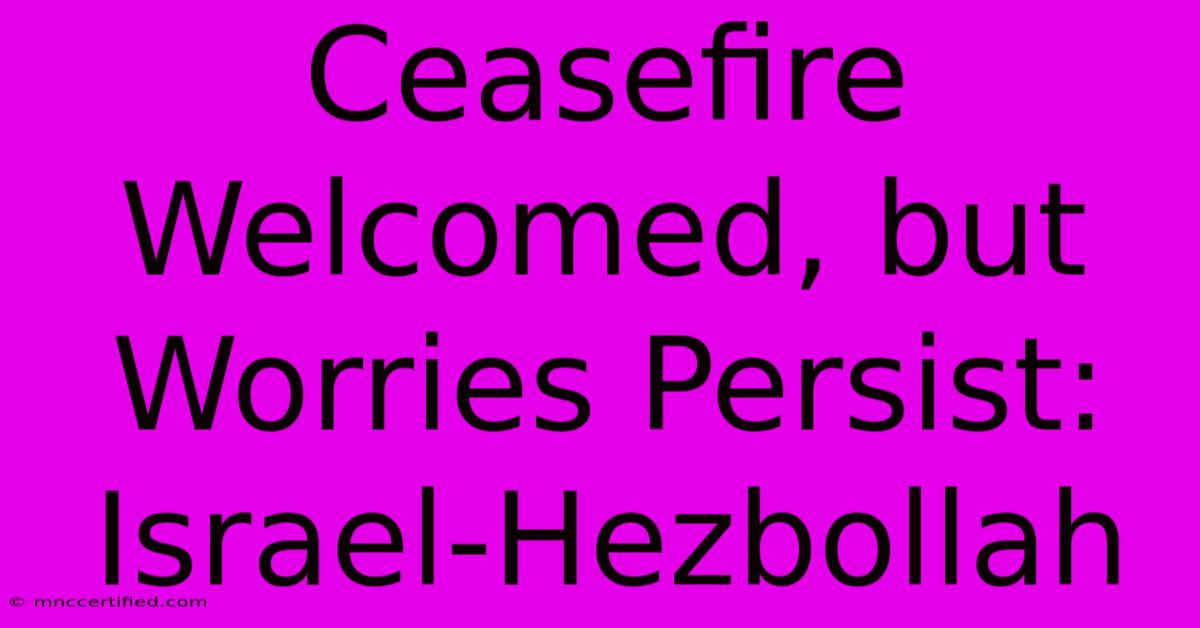Ceasefire Welcomed, But Worries Persist: Israel-Hezbollah

Table of Contents
Ceasefire Welcomed, but Worries Persist: Israel-Hezbollah Tensions
The recent ceasefire between Israel and Hezbollah has been met with a mixture of relief and apprehension. While the immediate cessation of hostilities is undeniably positive, underlying tensions and unresolved issues cast a long shadow over the fragile peace. This article delves into the complexities of the situation, exploring the reasons for the ceasefire, the lingering concerns, and the potential for future escalation.
A Necessary, but Precarious, Truce
The ceasefire, brokered with the help of [mention mediating parties, if applicable, e.g., UN, etc.], brought an end to [mention the duration and key events of the conflict]. The intense exchange of fire, involving [mention types of weaponry used, e.g., rockets, artillery, airstrikes], caused significant damage and loss of life on both sides. The immediate need to prevent further casualties undoubtedly played a significant role in the agreement. However, the ceasefire is not a peace treaty. It's a temporary pause in hostilities, leaving many critical issues unaddressed.
Key Factors Leading to the Ceasefire:
- International Pressure: International actors exerted significant pressure on both sides to de-escalate the situation, highlighting the risks of a wider regional conflict.
- Domestic Concerns: Both Israel and Hezbollah faced internal pressure to limit the escalating conflict, particularly concerning potential civilian casualties and economic repercussions.
- Military Stalemate: The conflict potentially reached a military stalemate, with neither side achieving a decisive victory, making a ceasefire a more palatable option.
Lingering Concerns and Unresolved Issues
While the cessation of violence is welcome, several significant concerns persist:
- Hezbollah's Arsenal: Hezbollah's vast arsenal of rockets and missiles remains a major threat to Israel. The ceasefire doesn't address the issue of Hezbollah's continued buildup and the potential for future attacks. This continues to be a significant source of instability in the region.
- The Palestinian Factor: The ongoing Israeli-Palestinian conflict significantly influences the Israel-Hezbollah dynamic. Any escalation in the West Bank or Gaza could easily reignite tensions along the Israel-Lebanon border.
- Unclear Objectives: The lack of clearly defined objectives beyond halting immediate violence raises questions about the long-term stability of the ceasefire. Without addressing root causes, future escalations remain likely.
- Humanitarian Crisis: The conflict has created a humanitarian crisis in [mention affected areas], requiring immediate and long-term assistance. Addressing the needs of displaced civilians is paramount.
- Border Security: The porous border between Israel and Lebanon continues to pose a significant security challenge. Enhanced border security measures are crucial to prevent future incidents and smuggling activities.
The Path Forward: Fragile Peace or Renewed Conflict?
The future of the Israel-Hezbollah relationship remains uncertain. The ceasefire provides an opportunity for dialogue and potential de-escalation, but success hinges on addressing the underlying issues. International mediation and a commitment to diplomatic solutions are crucial.
Building trust will be an extremely challenging process. Both sides need to demonstrate a willingness to engage in meaningful negotiations, addressing the core concerns of security, disarmament, and the resolution of underlying political issues. Failure to do so could easily lead to a renewed cycle of violence.
Keywords: Israel, Hezbollah, ceasefire, Lebanon, conflict, rockets, missiles, security, diplomacy, peace, international pressure, humanitarian crisis, Palestinian conflict, border security, escalation, de-escalation, regional stability.
Off-Page SEO Strategies:
- Social Media Promotion: Share the article on relevant social media platforms, engaging with users and encouraging discussion.
- Guest Blogging: Publish the article or a related piece on other relevant websites or blogs to expand reach.
- Outreach to Influencers: Contact relevant journalists, analysts, and bloggers to draw attention to the article.
- Forum Participation: Engage in online forums and discussions related to the Israel-Hezbollah conflict.
- Backlink Building: Develop relationships with relevant websites to acquire high-quality backlinks to the article.
By implementing both on-page and off-page SEO strategies, this article aims to maximize its visibility in search engine results pages, offering a comprehensive and informative overview of a complex and sensitive issue.

Thank you for visiting our website wich cover about Ceasefire Welcomed, But Worries Persist: Israel-Hezbollah. We hope the information provided has been useful to you. Feel free to contact us if you have any questions or need further assistance. See you next time and dont miss to bookmark.
Featured Posts
-
Lana Del Rey 25 000 Ticket Queue
Nov 28, 2024
-
Liverpool Defeat Real Madrid 2 0
Nov 28, 2024
-
Bhattacharya Leads Under Trump
Nov 28, 2024
-
Invest In Womens Sports Shirt
Nov 28, 2024
-
Invest Fest Atlanta 2024 Dates
Nov 28, 2024